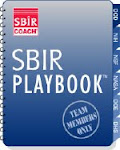I decided a couple of months ago that beating the SBIR drum was just making noise that no one (but a few of us in what's loosely called the Advocacy) cared about. I was getting a headache and decided I'd had enough. I wasn't going to write any more about SBIR reauthorization until something significant happened.
Well, nothing significant (or at least that's made any difference in getting a bill passed) has occurred, except for some behind-the-scenes (don'tcha just love the transparency) maneuvering to get the Senate's compromise worded so both the House and Senate can agree on something. They couldn't get it done by the end of July, so it's now September 30th before we'll, probably at the last minute, see a bill. Hopefully. But, frankly, after what's gone on this year, nothing our legislators do will surprise me. (Monitor www.SBIRreauthorization.com and Rick Shindell's SBIR Insider for updates.)
This isn't rocket science. It shouldn't be so hard to come up with an SBIR compromise if everyone involved really was interested in defining a program that worked better than what we've got. Wishful thinking perhaps, but ya' know, maybe they need to engage rocket scientists to work on this instead of lawyers. At some point, everyone needs a rocket scientist to get past a really tough problem and make things work better.
Hmmm... Don'tcha wish you could call up a "hire a rocket scientist" service and quickly get one to work on a tough problem you've got? No strings attached? And that service be free? ... Actually you can. Really!
I had coffee last week with Shaun Tinoco of The Space Alliance Technology Outreach Program (SATOP). I thought I knew just about everything available to small technology businesses, especially the free (and non-dilutive) support opportunities, but the SATOP opportunity had eluded my ken.
As Shaun enthusiastically explained: "The SATOP program helps those small businesses and entrepreneurs that have hit a bump in the road during their product development. By simply submitting a short Request for Technical Assistance (RTA) via our website: http://www.spacetechsolutions.com/, they will be put in touch with the brightest engineers and researchers to solve their specific issue within 40 hours. This gets them back on the road to future revenue generation in a short time-frame and at no financial cost."
While this is a NASA supported program, no NASA connection is necessary. Any small business may apply. And the technologies involved need not be just ones NASA might be interested in. Just take a gander at their "Success Stories". A couple dozen industries have been helped, including consumer products and food processing.
And did you catch that this "rocket scientist" (likely to be an employee of one of the big NASA prime contractors) you'll be engaging with comes absolutely free of charge? In fact, more than 50 different aerospace companies, universities, and NASA centers have committed in excess of 30,000 hours to providing this free assistance to small businesses via SATOP. In the famous words of NASA legend Wernher von Braun, "It verks!"
Want an informative 2-page SATOP flyer? Click on the Astronaut to download it.

Shaun's final word: "Small businesses should not pass up this opportunity for free NASA support while federal funding is in place." I agree, Shaun!
There's so much more to talk about than reauthorization. I got in a rut about it, but have climbed out, and picked up the "pen" again. Expect more from me on a more regular basis. Thanks to the many of you who have encouraged me to write.
.










4 comments:
Great, Fred, talk up SBIR as a program with some revised useful and coherent objective that can be measured for results. Something much more than a slot machine that takes "$750K coins of the realm" with a low or unknown payout ratio. Remember a rule of government: input is political output, not tangible results output. Aren't three decades of SBIR junkies and self-serving federal agency management enough?
Now Carl, if SBIR were only feeding the habits of "SBIR junkies", I'd agree. (And, yes, there are some of those out there. I wish they'd grow up and wean themselves from the Government Teat.) But MY three decades of experience with this community has been with many dozens of true entrepreneurs who were able to get their start and do good, innovative, and important work with SBIR having been their seed funding. That's what I want to see continue.
AS far as those "self-serving federal agency management" types -- there aren't very many of those out there in this community. By and large those who are at the SBIR Program Manager posts are honorable, fair and really try and do their best to make SBIR successful for the small business. They often have to struggle within their own Agencies for the resources to do their jobs well. From our interaction at SBIR events I've come to know almost all of them, and am proud to be able to work with them.
So, please be constructive, Carl. SBIR will continue. Let's all work to make it work better, and improve the ROI for everyone involved.
The $750 investment is ALWAYS PRECEDED, in SBIR grants, by a $150,000/6-months proof of concept study, carried out according to a protocol that is subject to peer review, and funded on a competitive basis. The SBIR funding is thus clearly milestone-based. The same cannot be said of regular, academic grants. The term "slot machine" is more appropriate in the case of academic welfare system.
I can see that you are putting a lot of time and effort into your blog and detailed articles! I am deeply in love with every single piece of information you post here
Post a Comment